Plant growth and reproduction -> asexual reproduction
Asexual Reproduction
Asexual reproduction is a type of reproduction that only involves one parent. The offspring produced are genetically identical to the parent.
Methods of Asexual Reproduction:
- Binary Fission: The parent organism divides into two equal parts, producing two identical offspring. This method is common in single-celled organisms like bacteria and amoeba.
- Budding: A small part of the parent organism grows as an outgrowth and eventually detaches to form a new individual. This method is seen in organisms like yeast and hydra.
- Regeneration: The ability of an organism to regrow a lost body part into a complete organism. For example, starfish can regenerate a new body from a lost arm.
- Spore Formation: Specialized reproductive cells called spores are produced by the parent organism and develop into new individuals. This method is observed in fungi and some plants.
Advantages and Disadvantages of Asexual Reproduction:
Asexual reproduction offers advantages such as rapid reproduction and efficient use of resources. However, it also leads to limited genetic diversity and makes the population vulnerable to diseases and environmental changes.
Examples of Asexual Reproduction:
Common examples of asexual reproduction include bacteria reproducing by binary fission, yeast reproducing by budding, and plants reproducing through runners or tubers.
Study Tips for Asexual Reproduction:
- Understand the different methods of asexual reproduction and their specific examples.
- Compare and contrast asexual reproduction with sexual reproduction to understand their differences and advantages/disadvantages.
- Review the importance of genetic diversity in a population and how asexual reproduction affects it.
- Practice identifying examples of asexual reproduction in different organisms.
◂Science Worksheets and Study Guides Fourth Grade. Plant growth and reproduction
Study Guide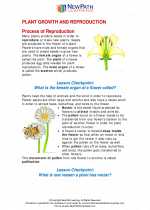 Plant growth and reproduction
Plant growth and reproduction  Worksheet/Answer key
Worksheet/Answer key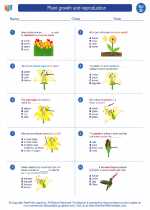 Plant growth and reproduction
Plant growth and reproduction  Worksheet/Answer key
Worksheet/Answer key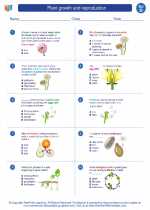 Plant growth and reproduction
Plant growth and reproduction  Worksheet/Answer key
Worksheet/Answer key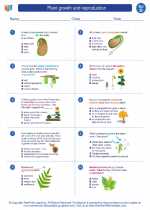 Plant growth and reproduction
Plant growth and reproduction  Vocabulary/Answer key
Vocabulary/Answer key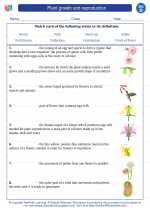 Plant growth and reproduction
Plant growth and reproduction  Vocabulary/Answer key
Vocabulary/Answer key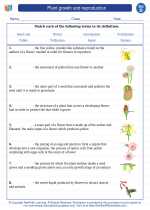 Plant growth and reproduction
Plant growth and reproduction 

 Worksheet/Answer key
Worksheet/Answer key
 Worksheet/Answer key
Worksheet/Answer key
 Worksheet/Answer key
Worksheet/Answer key
 Vocabulary/Answer key
Vocabulary/Answer key
 Vocabulary/Answer key
Vocabulary/Answer key

The resources above cover the following skills:
Life Science
Heredity and Reproduction - A. Offspring of plants and animals are similar to, but not exactly like, their parents or each other. B. Life cycles vary among organisms, but reproduction is a major stage in the life cycle of all organisms.
Identify processes of sexual reproduction in flowering plants, including pollination, fertilization (seed production), seed dispersal, and germination.
Compare and contrast the major stages in the life cycles of Florida plants and animals, such as those that undergo incomplete and complete metamorphosis, and flowering and nonflowering seed-bearing plants.